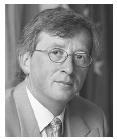LUXEMBOURG
Jean-Claude Juncker
Prime Minister

(pronounced "zhan-claud YUN-ker")
"I think there can be no Luxembourg view, because in the [European] Union people should practice dual patriotism. To us this means a Luxembourg and a European patriotism."
The Grand Duchy of Luxembourg is one of the smallest countries in Western Europe, encompassing only 2,586 sq km (999 sq mi). Wedged among three countries, Germany to the east, Belgium to the north and west, and France to the south, Luxembourg's geographic location provides its inhabitants with the advantage of having prosperous neighbors that help to fuel its economy. Luxembourg is quite densely populated, with a population estimated at 448,569 people as of July 2002. The capital is Luxembourg-Ville (Lutzelburg).
Since 1985, the official language has been Letzeburgish, a German dialect with French flavoring, but both French and German are used: French in government offices and German in commercial enterprises and the press. Students are taught in both French and German in school. About 95% of its population is Roman Catholic.
The economy is strong and in 2002, it provided Luxembourgers with an estimated annual per capita gross domestic product (GDP) of US $44,000, the highest of any of the European Union (EU) countries. Steel and chemicals are important industries, and they provide many of Luxembourg's principal exports: base metals and manufactures, machinery and transport equipment, rubber, plastics, as well as textiles and clothing, stone ceramics, and glassware. Most trade occurs with other EU countries. Since the 1970s, international finance and insurance have gained a dominant position in the economy. In 2002, Luxembourg became one of twelve nations to adopt the euro as official currency.
ADDRESS
Office of the Prime Minister
Hotel de Bourgogne
4, rue de la Congregation
2910 Luxembourg
Comment about this article, ask questions, or add new information about this topic: